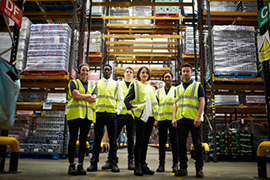When Business Steps Up – Syrian Refugees One Year Later
 Government support for refugees in Canada ends after one year. For many, their year of support is over, or almost over. For many, too, the question is, “What’s next?” Media headlines about barriers to employment for Syrian refugees suggest the future is bleak. Many news items, however, are upbeat and some, like stories about the achievements of Guelph businessman, Jim Estill, are heartwarming. They tell us the good things that can happen when business steps up and addresses the challenge with innovative programs that help refugees add value to the economy.
Government support for refugees in Canada ends after one year. For many, their year of support is over, or almost over. For many, too, the question is, “What’s next?” Media headlines about barriers to employment for Syrian refugees suggest the future is bleak. Many news items, however, are upbeat and some, like stories about the achievements of Guelph businessman, Jim Estill, are heartwarming. They tell us the good things that can happen when business steps up and addresses the challenge with innovative programs that help refugees add value to the economy.
The Challenge
The challenge is significant. In 2016, Canada welcomed more than 35,000 refugees. In December, the Globe and Mail reported that based on an Immigration, Refugees and Citizenship Canada survey, more than half of privately sponsored Syrians who arrived by March 1 had found employment, but the employment rate among government assisted refugees was around 12%.1 Clearly, more needs to be done, especially for professionals like the veterinary and dentist featured in the Globe and Mail report who have been unable to find work and have not managed to re-enter their professions because of barriers such as proof of academic credentials and certifications. Moreover, finding work is difficult for any newcomer who does not speak one of Canada’s official languages. That said, there are success stories – stories that point to ways business can help.
Jim Estill – Ease into Canada
Jim Estill, president of the Danby Group in Guelph, Ontario, is leading the way. A wealthy businessman who is personally sponsoring 58 families at a cost of around $1.5 million says he became involved in helping refugees because it was “the right thing” to do. His is a major operation, organized like a business – “supervising 800 volunteers is not much different from running a business with 800 employees.” You can read more about his initiative in last spring’s issue of bh2 or Mark Mann’s more recent article in Toronto Life3, which is the source of much of the information here.
Since being interviewed for the bh feature, Estill has launched his Ease into Canada program to help refugees without experience or English language skills get hired in Guelph factories. Here is how Mann described Estill’s initiative in Toronto Life:
[Estill] established Ease into Canada, a program at the Danby warehouse in which newcomers can get jobs, train to work in a factory and study English. Any Syrian who applies – even if they’re not one of Estill’s refugees – gets a job at Danby as part of the three-month program, either as a warehouse handler or working the returns line. The program offers flexible schedules and in-house ESL classes twice a week.3
But Estill’s efforts don’t stop there. He has arranged for a line of credit to help a young Syrian open a dollar store, set up a tailor shop for another, and arranged for a pizza chef from Syria to run a pizza business out of a Guelph mosque with a commercial kitchen. In December, Estill envisioned a future for the pizza enterprise: “We’re looking for a restaurant to rent. The beauty of a restaurant is that it would employ a lot of people—kitchen staff, servers—and it would absorb people on evenings and weekends.”4 By now, it is likely that the restaurant is a reality and Estill has gone on to new goals.
He is not working alone, however. The Muslim Society of Guelph has taken the lead in helping with infrastructure and coordinating the initiative’s extensive network of volunteers, including individuals, community organizations, and faith groups of many denominations.
Peace Chocolate – An Entrepreneur’s Story
A success story in Antigonish, Nova Scotia, shares many of the characteristics of what is happening in Guelph. The community has banded together to help a chocolate maker from Syria launch a small chocolate factory. Back home in Damascus, Isam Hadad operated a factory with 30 employees and exported his candies throughout the Middle East. After his home and factory were destroyed in 2013, Hadad and his family escaped to a refugee camp in Lebanon. They arrived in Canada in January 2016. One year later, with the help of people in their new community of Antigonish, Hadad has re-launched his business, calling it Peace by Chocolate. Within a few months of start-up, he was able to donate a portion of his profits to help the people of Fort McMurray following last May’s wildfire. The business is a success and now the family is looking to the future. On a recent CBC radio program son Tareq, who speaks English, described the family’s plan to extend internet sales across the country (already a reality), and to hire other Syrians to help. Like the fledgling restaurant in Guelph, this new business started by refugees is on track to provide jobs for other refugees. Moreover, Peace by Chocolate is already famous – Justin Trudeau featured it in an address at the United Nations in New York. Click here to find out more about the family and its business, order chocolates for yourself and hear part of Trudeau’s UN speech or listen to the CBC interview with Tareq on ![]() The Story from Here, Part Two, January 11, 2017 [Minute 17:52-20:47. For the experience of the first Syrian refugees in Prince George, BC, listen at Minute 8:31-17.51].
The Story from Here, Part Two, January 11, 2017 [Minute 17:52-20:47. For the experience of the first Syrian refugees in Prince George, BC, listen at Minute 8:31-17.51].
Skilled Employees at Coppley Ltd.
But success stories don’t just involve training initiatives or entrepreneurship. Many refugees find work for others using skills they brought with them to Canada, often skills like sewing that are difficult to find among Canadian-born workers. For example, Coppley Ltd., a maker of custom-tailored high-end clothing in Hamilton, Ontario, hired a Syrian couple in January 2016 and by December had about 20 workers who are Syrian refugees. Co-workers help with communication and the company even hires interpreters when necessary. Coppley’s finance and human-resources manager, Julie Dubber, says the Syrians are “thrilled” to be safe and has high praise for the new employees:
“They show up for work every day, they’re happy, they are very hard workers, they’re starting their lives all over and a lot of the folks coming here are very highly skilled, very well-educated.”1
What is the Takeaway?
In each example, success came to Syrian refugees because people helped and more specifically, because businesses helped. Estill’s Ease into Canada program is the most organized and dramatic. What would happen if his idea spread and companies across the country launched similar initiatives? What would happen if it became a model for helping, not just refugees, but any pool of potential employees who are disadvantaged and need extra support to fully participate in the workforce? Similarly, what would be the multiplier effect if many who were helped to launch their own businesses started hiring more people? In an employment climate where trends indicate that the labour force is shrinking, the introduction of new workers is a bonus.
In a bh interview last spring, Jim Estill advised other businesses to become involved – but for the right reasons:
We are in the midst of a humanitarian crisis. We need to stand up and be counted. Everyone needs to contribute … Business people have the resources. They are leaders and, at this time, leadership is necessary. This project has made me proud to be a Canadian, and proud to be at Danby.2
Others have noticed too. Estill has just been awarded the Order of Ontario, but perhaps the most valued praise comes from the refugees themselves – “We are so grateful to Mr. Jim Estill…. God be with him.”3
NOTE: To access Jim Estill’s new GoFundMe campaign, donate to The Muslim Society of Guelph, or discover a range of resources about his Syrian refugee initiative, go to www.gofundme.com/syriarefugeetailor bh
References
1 Tavia Grant. 2016, December 05. One year after arrival, Syrian refugees continue to face employment barriers. The Globe and Mail. Available: www.theglobeandmail.com/news/national/syrian-refugees-facing-barriers-to-finding-work-one-year-after-arrival/article33204887/
2 businesshealth®. 2016, Spring. View from the Top: Jim Estill. bh, 12 (2).
3 Mark Mann. 2016, December 20. The Man Who Saved 200 Syrian Refugees. Toronto Life. Available: torontolife.com/city/life/jim-estill-the-man-who-saved-200-syrian-refugees
4 Mark Mann. 2016, December 22. Q&A: Jim Estill, who’s sponsoring 58 Syrian refugee families, on what’s next. Toronto Life. Available: torontolife.com/city/life/qa-jim-estill-whos-sponsoring-58-syrian-refugee-families-whats-next


